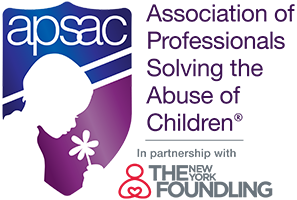No events currently active.

  | January 2026 |   | ||||
| Sun | Mon | Tue | Wed | Thu | Fri | Sat |
| 1 | 2 | 3 | ||||
| 4 | 5 | 6 | 7 | 8 | 9 | 10 |
| 11 | 12 | 13 | 14 | 15 | 16 | 17 |
| 18 | 19 | 20 | 21 | 22 | 23 | 24 |
| 25 | 26 | 27 | 28 | 29 | 30 | 31 |
Events available for Registration...
Mental Health Section - 2025
1/7/2025 - 12/2/2025
register for this event...
The APSAC Prevention Series
1/16/2025 - 12/18/2025
register for this event...
The New York Foundling & APSAC Webinar Series on Controversial Topics
1/29/2025 - 11/12/2025
register for this event...
Healthcare Section
7/15/2025 - 11/18/2025
register for this event...
Mental Health Section - 11/2025
11/4/2025 - 11/4/2025
register for this event...
The New York Foundling & APSAC Webinar Series on Controversial Topics
11/12/2025 - 11/12/2025
register for this event...
Healthcare Section - 11/2025
11/18/2025 - 11/18/2025
register for this event...
Faith Section
11/21/2025 - 11/21/2025
register for this event...
Mental Health Section - 12/2025
12/2/2025 - 12/2/2025
register for this event...
Do No Harm: Interviewing Skills Needed When There?s a Concern of Child Abuse: The Why, The When, and The How
1/5/2026 - 6/18/2026
register for this event...
Zoom Chat: Improving Advocacy for Children Placed in Congregate Care Facilities
1/14/2026 - 1/14/2026
register for this event...
2026 APSAC Colloquium - New Orleans, LA
6/14/2026 - 6/18/2026
register for this event...
Zoom Chat: Advocacy: Supporting Parents of Children with Disabilities?
10/8/2026 - 10/8/2026
register for this event...
Mental Health Section - 2025
1/7/2025 - 12/2/2025
register for this event...
The APSAC Prevention Series
1/16/2025 - 12/18/2025
register for this event...
The New York Foundling & APSAC Webinar Series on Controversial Topics
1/29/2025 - 11/12/2025
register for this event...
Healthcare Section
7/15/2025 - 11/18/2025
register for this event...
Mental Health Section - 11/2025
11/4/2025 - 11/4/2025
register for this event...
The New York Foundling & APSAC Webinar Series on Controversial Topics
11/12/2025 - 11/12/2025
register for this event...
Healthcare Section - 11/2025
11/18/2025 - 11/18/2025
register for this event...
Faith Section
11/21/2025 - 11/21/2025
register for this event...
Mental Health Section - 12/2025
12/2/2025 - 12/2/2025
register for this event...
Do No Harm: Interviewing Skills Needed When There?s a Concern of Child Abuse: The Why, The When, and The How
1/5/2026 - 6/18/2026
register for this event...
Zoom Chat: Improving Advocacy for Children Placed in Congregate Care Facilities
1/14/2026 - 1/14/2026
register for this event...
2026 APSAC Colloquium - New Orleans, LA
6/14/2026 - 6/18/2026
register for this event...
Zoom Chat: Advocacy: Supporting Parents of Children with Disabilities?
10/8/2026 - 10/8/2026
register for this event...
Events in the month of January 2026